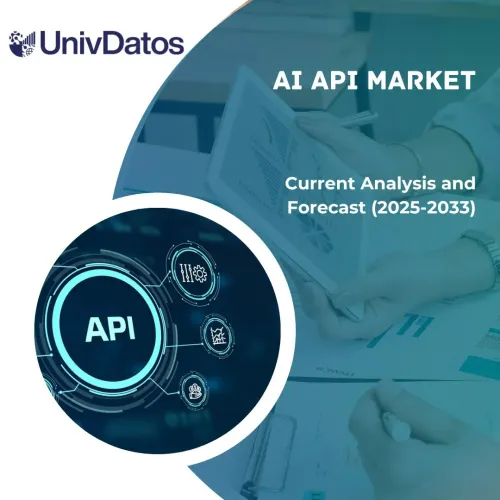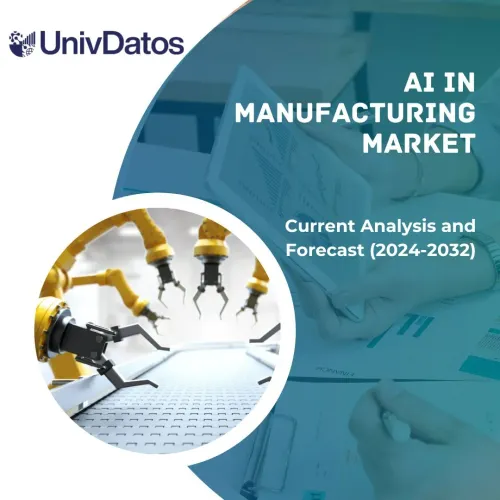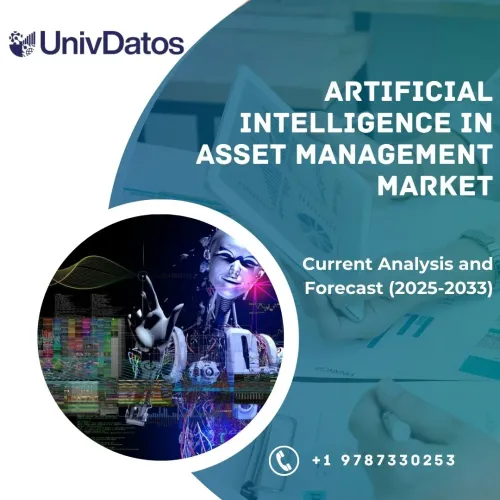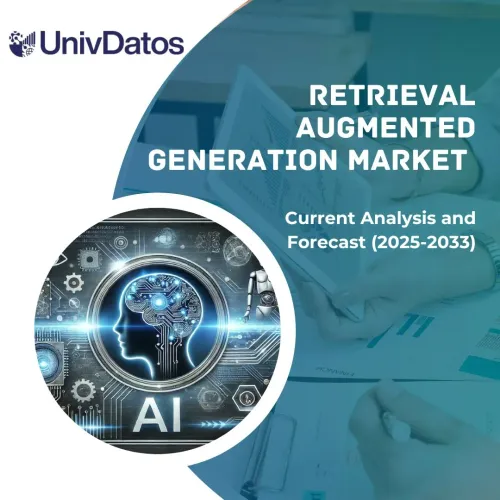- Home
- About Us
- Industry
- Services
- Reading
- Contact Us
Artificial Intelligence in Healthcare Market: Current Analysis and Forecast (2025-2033)
Emphasis on Technology (Machine Learning, Deep Learning, Artificial Neural Network), Applications (Robotic Surgery, Diagnosis, Virtual Nursing Assistance, Administrative Workflow Assistance); Offerings (Hardware, Software and Services) and Region
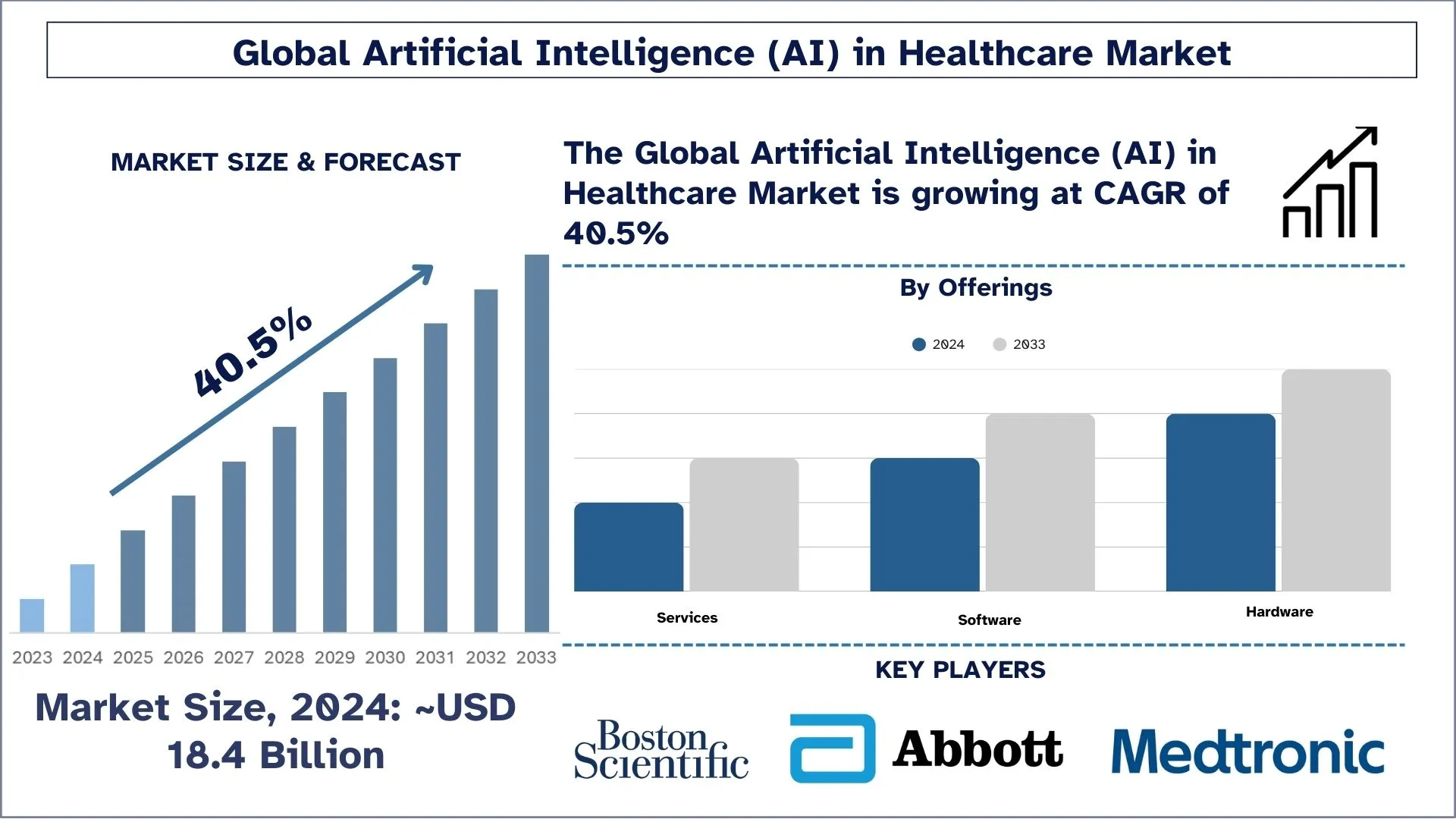
Artificial Intelligence (AI) in Healthcare Market Size & Forecast
The Artificial Intelligence (AI) in Healthcare market was valued at approximately USD 18.4 billion in 2024 and is expected to grow at a substantial CAGR of around 40.5% during the forecast period (2025-2033), owing to the growing need for faster and more accurate diagnostics.
Artificial Intelligence (AI) in Healthcare Market Analysis
Artificial Intelligence is the development of computer systems that can perform tasks that would require human intelligence with much higher precision and error control than that done by humans. AI facilitates the creation of intelligent agents, where an intelligent agent is a system that recognizes its environment of operation and takes actions that maximize its likelihood of success. The importance of AI in healthcare was realised in the early 1980s when the absence of proper data management and the requirement of extreme precision, along with the importance of minimally invasive methods, were recognised. Artificial intelligence is a branch of computer science and information technology that can analyse complex medical data. Today, in the age of breakthrough technology and automation, the research and implementation of AI in healthcare are at their best. The healthcare sector is one of the most important sectors that is a priority for humans. Owing to its amalgamation with the IT industry, the growth and development of the healthcare industry have increased and reached the next level.
Artificial Intelligence (AI) in Healthcare Market Trends
This section discusses the key market trends influencing the various segments of artificial intelligence (AI) in the healthcare market as identified by our research experts.
Integration of AI in Medical Imaging and Diagnostics
One of the trends in the market of applying AI in the healthcare sector is the use of AI in Medical Imaging and Diagnostics. AI is being applied in the differentiation and diagnosis of imaging data, including X-ray, MRI, and CT scans, through accuracy and rapidity. Such integration assists in early identification of the anomalies and diseases, hence improving patients’ health status. Furthermore, diagnostic applications of AI are helpful for radiologists and clinicians, taking a load off for them, apart from reducing the potential for errors. This is expected to receive a major boost from the growth in artificial intelligence, which is bound to improve efficiency in medical imaging.
Artificial Intelligence (AI) in Healthcare Market Industry Segmentation
This section provides an analysis of the key trends in each segment of the global Artificial Intelligence (AI) in healthcare market report, along with forecasts at the global, regional, and country levels for 2025-2033.
The Machine Learning Segment is Expected to Witness a Higher CAGR than the Artificial Intelligence (AI) in Healthcare Market.
Based on technology, the global AI in healthcare market has been segmented into machine learning, deep learning, and artificial neural networks. Out of these technologies, in 2024, machine learning dominated the market globally and is expected to maintain its lead in 2033. The increasing power of machine learning in diagnosing disease and in categorizing and classifying health data is empowering physicians and speeding up decision-making across medical facilities, including hospitals or clinics.
The Robotic Surgery Segment Holds the Largest Share of the Market.
Based on technology, the global AI in the healthcare market has been segmented into robotic surgery, diagnosis, virtual nursing assistance, and administrative workflow assistance. Among these, the robotic surgery category is dominating the market as it enhances surgical precision and efficiency. AI-powered robots assist surgeons with real-time data, enabling better control, smaller incisions, and fewer complications. This leads to faster recovery, reduced hospital stays, and improved patient outcomes, making robotic-assisted procedures increasingly popular in modern healthcare.
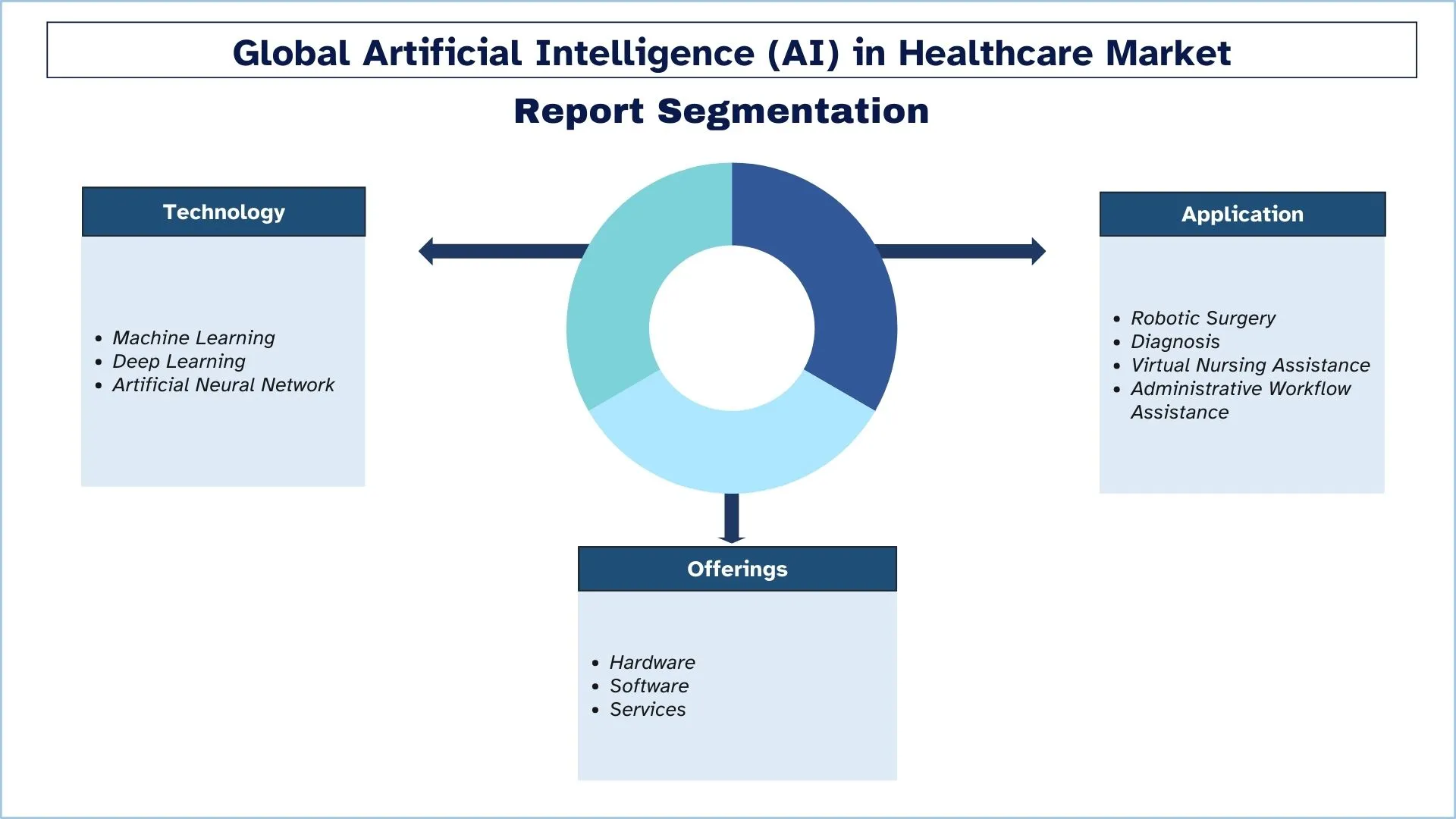
North America has a significant share of the market in 2024.
Artificial intelligence in the healthcare market in North America has been on an upsurging trend due to the high adoption rate of AI in countries such as the US and Canada, paired with the development and growth of research & development activities that combine the investments by government and private organizations. As far as the Asia-Pacific region is concerned, it has lagged North America and Europe in terms of technology adoption. However, AI is one technology area where Asia-Pacific can stand apart, compared to other regions, and is expected to witness the highest growth in the forecast period.
U.S. Dominates the North American Artificial Intelligence (AI) in Healthcare Market
The artificial intelligence in the US healthcare sector is enjoying increasing growth because of the adoption of advanced technologies, including machine learning, natural language processing as well and computer vision. These technologies are improving the diagnostic capabilities, the provision of prescriptions, administration, and treatment options. The call for the use of AI is fuelled by the ever-rising need for efficiency in service delivery, especially in the health sector, the rising cost of health care provision, and emphasis on patient satisfaction. Therefore, the adoption of AI is increasing in various sectors in the United States, including in the aspect of healthcare where it is now vital in helping medical practitioners diagnose, treat, and manage diseases.
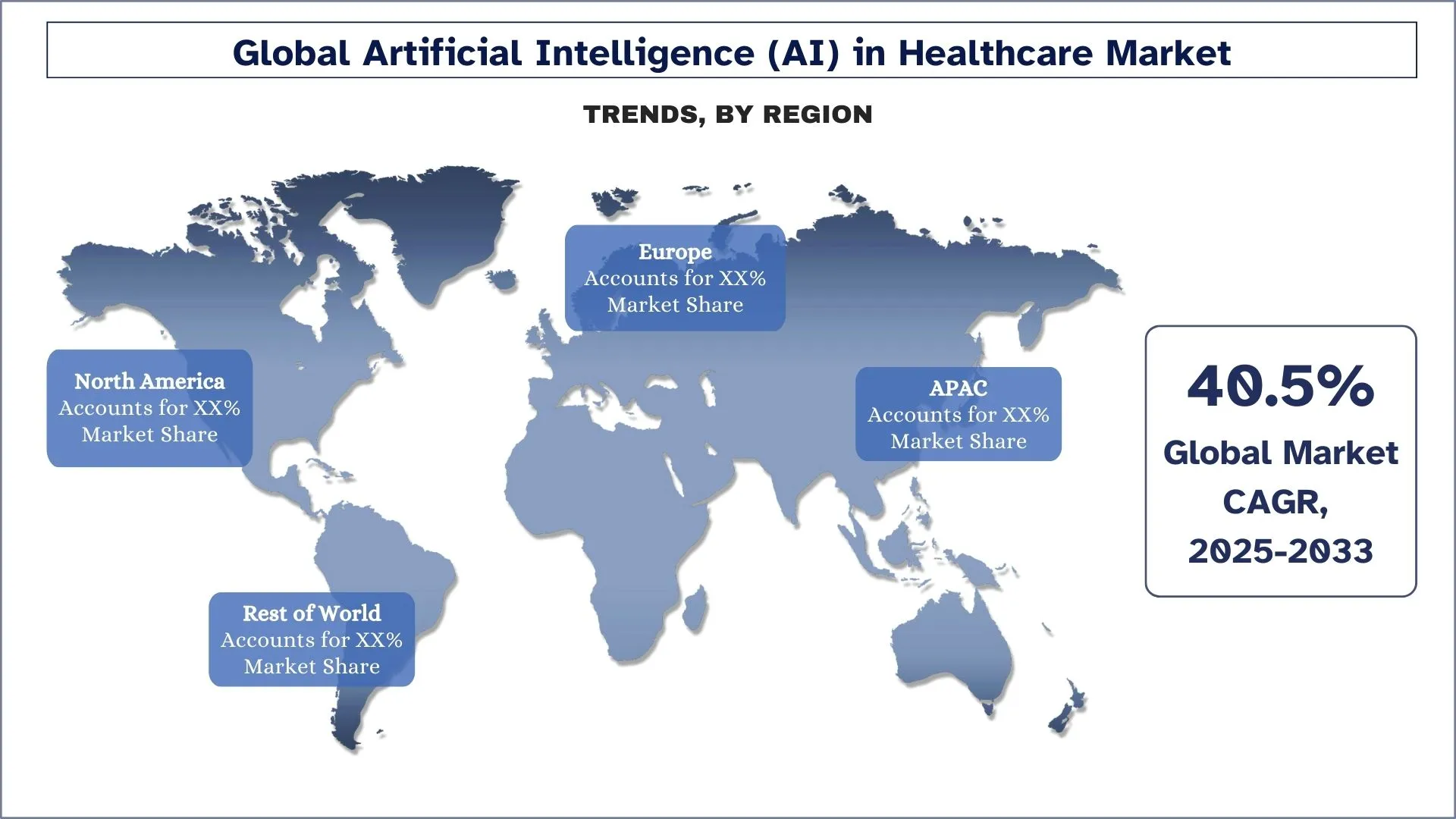
Artificial Intelligence (AI) in Healthcare Market Industry Competitive Landscape
The Artificial Intelligence (AI) in Healthcare market is competitive, with several global and international players. The key players are adopting different growth strategies to enhance their market presence, such as partnerships, agreements, collaborations, new product launches, geographical expansions, and mergers and acquisitions.
Top Artificial Intelligence (AI) in Healthcare Market Companies
Some of the major players operating in the market are Medtronic Plc, Abbott Laboratories, Johnson & Johnson, BD, Boston Scientific Corporation, Koninklijke Philips N.V., Roche Holding AG, Siemens Healthineers AG, Stryker Corporation, and Oracle Corporation.
Recent Developments in the Artificial Intelligence (AI) in Healthcare Market
In March 2024, Microsoft collaborated with NVIDIA to enhance AI innovation and accelerate computing capabilities. This collaboration leverages Microsoft Azure's global scale and advanced computing along with NVIDIA’s DGX Cloud and Clara suite, to accelerate innovation and improve patient care.
In March 2024, NVIDIA introduced new Generative AI Microservices to transform medical technology (MedTech), drug discovery, and digital health. This innovative approach aims to reshape healthcare technology by harnessing advanced AI capabilities.
Artificial Intelligence (AI) in Healthcare Market Report Coverage
Report Attribute | Details |
Base year | 2024 |
Forecast period | 2025-2033 |
Growth momentum | Accelerate at a CAGR of 40.5% |
Market size 2024 | USD 18.4 Billion |
Regional analysis | APAC, Europe, Asia-Pacific, Rest of the World |
Major contributing region | North America is expected to grow at the highest CAGR during the forecasted period. |
Key countries covered | U.S., Canada, Germany, France, UK, Spain, Italy, China, Japan, and India |
Medtronic Plc, Abbott Laboratories, Johnson & Johnson, BD, Boston Scientific Corporation, Koninklijke Philips N.V., Roche Holding AG, Siemens Healthineers AG, Stryker Corporation, and Oracle Corporation | |
Report Scope | Market Trends, Drivers, and Restraints; Revenue Estimation and Forecast; Segmentation Analysis; Demand and Supply Side Analysis; Competitive Landscape; Company Profiling |
Segments Covered | By Technology, By Application, By Offerings, By Region/Country |
Reasons to Buy Artificial Intelligence (AI) in Healthcare Market Report:
The study includes market sizing and forecasting analysis validated by authenticated key industry experts.
The report presents a quick review of overall industry performance at a glance.
The report covers an in-depth analysis of prominent industry peers with a primary focus on key business financials, product portfolios, expansion strategies, and recent developments.
Detailed examination of drivers, restraints, key trends, and opportunities prevailing in the industry.
The study comprehensively covers the market across different segments.
Deep dive regional-level analysis of the industry.
Customization Options:
The global artificial intelligence (AI) in the healthcare market can be customized further as per the requirements or any other market segment. Besides this, UnivDatos understands that you may have your own business needs; hence, feel free to contact us to get a report that completely suits your requirements.
Table of Content
Research Methodology for Artificial Intelligence (AI) in Healthcare Market Analysis (2023-2033)
We analyzed the historical market, estimated the current market, and forecasted the future market of the global Artificial Intelligence (AI) in Healthcare Market to assess its application in major regions worldwide. We conducted exhaustive secondary research to gather historical market data and estimate the current market size. To validate these insights, we carefully reviewed numerous findings and assumptions. Additionally, we conducted in-depth primary interviews with industry experts across the Artificial Intelligence (AI) in Healthcare Market value chain. After validating market figures through these interviews, we used top-down and bottom-up approaches to forecast the overall market size. We then employed market breakdown and data triangulation methods to estimate and analyze the market size of industry segments and sub-segments.
Market Engineering
We employed data triangulation techniques to finalize the overall market estimation and derive precise statistical numbers for each segment and sub-segment of the global Artificial Intelligence (AI) in Healthcare Market. We split the data into several segments and sub-segments by analyzing various parameters and trends, including technology, application, offerings, and regions within the global Artificial Intelligence (AI) in Healthcare Market.
The main objective of the Global Artificial Intelligence (AI) in Healthcare Market Study
The study identifies current and future trends in the global Artificial Intelligence (AI) in Healthcare Market, providing strategic insights for investors. It highlights regional market attractiveness, enabling industry participants to tap into untapped markets and gain a first-mover advantage. Other quantitative goals of the studies include:
- Market Size Analysis: Assess the current and forecast market size of the global Artificial Intelligence (AI) in Healthcare Market and its segments in terms of value (USD).
- Artificial Intelligence (AI) in Healthcare Market Segmentation: The study segments the market by technology, application, offerings, and region.
- Regulatory Framework & Value Chain Analysis: Examine the regulatory framework, value chain, customer behavior, and competitive landscape of the Artificial Intelligence (AI) in Healthcare Market industry.
- Regional Analysis: Conduct a detailed regional analysis for key areas such as Asia Pacific, Europe, North America, and the Rest of the World.
- Company Profiles & Growth Strategies: Company profiles of the Artificial Intelligence (AI) in Healthcare Market and the growth strategies adopted by the market leaders to sustain the fast-growing market.
Frequently Asked Questions FAQs
Q1: What is the artificial intelligence (AI) in the healthcare market's current size and growth potential?
As of 2024, the global Artificial Intelligence (AI) in Healthcare market is valued at approximately USD 18.4 billion and is projected to grow at a CAGR of 40.5% through 2033.
Q2: What are the driving factors for the growth of artificial intelligence (AI) in the healthcare market?
The growing need for faster and more accurate diagnostics is driving AI adoption, helping healthcare providers detect diseases early and improve patient outcomes.
Q3: Which market has the largest share of artificial intelligence (AI) in the healthcare market by technology?
The machine learning category dominates the global Artificial Intelligence (AI) in healthcare market by the technology segment.
Q4: What are the major trends in artificial intelligence (AI) in the healthcare market?
Integration of AI with medical imaging and diagnostics is a rising trend, enabling automated analysis of X-rays, MRIs, and CT scans with improved precision.
Q5: Which region will dominate the artificial intelligence (AI) in the healthcare market?
The North America region currently dominates the global artificial intelligence (AI) in the healthcare market.
Q6: What are the biggest challenges in the artificial intelligence (AI) in healthcare market?
A key challenge is data privacy and security, as healthcare AI relies on sensitive patient data that must comply with strict regulations like HIPAA and GDPR.
Q7: Who are the Top players in the global artificial intelligence (AI) in healthcare market?
The leading companies driving innovation in the artificial intelligence (AI) in healthcare market include:
• Medtronic Plc
• Abbott Laboratories
• Johnson & Johnson
• BD
• Boston Scientific Corporation
• Koninklijke Philips N.V.
• Roche Holding AG
• Siemens Healthineers AG
• Stryker Corporation
• Oracle Corporation
Q8: What are the most promising investment opportunities within the AI in Healthcare landscape?
Key investment areas include AI-powered diagnostics, robotic surgery, virtual health assistants, predictive analytics platforms, and personalized medicine solutions. Companies focusing on regulatory-compliant, scalable AI technologies with strong clinical validation are especially attractive to investors.
Q9: How can healthcare businesses effectively integrate AI into their existing systems?
Successful integration involves assessing current IT infrastructure, partnering with experienced AI vendors, ensuring compliance with healthcare regulations, and training staff on AI tools. Starting with pilot projects in high-impact areas like diagnostics or workflow automation can accelerate adoption and demonstrate value.
Related Reports
Customers who bought this item also bought


